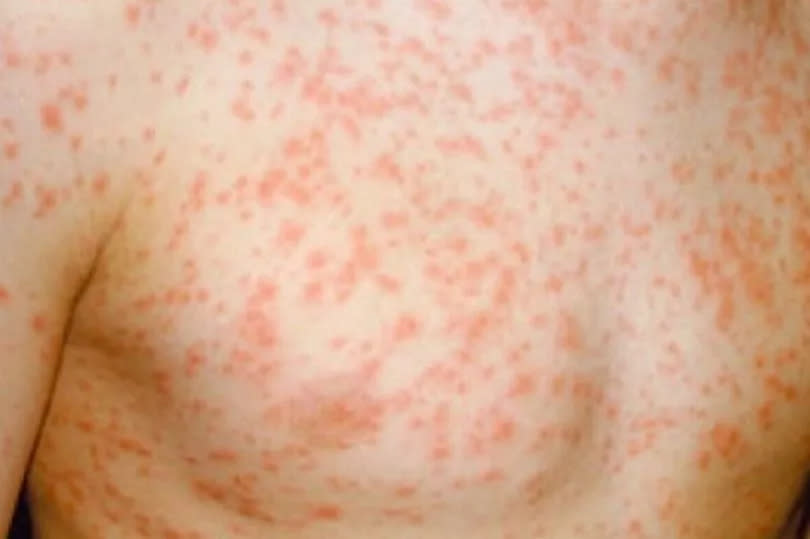All measles symptoms as infections TRIPLE in just months

England is facing sweeping cases of measles with more than three times as many infections so far this year than during the whole of 2023 - as a new map shows clusters of suspected outbreaks.
Data from the UK Health Security Agency (UKHSA) shows that more than 1,000 cases of measles have been confirmed by lab tests in England so far this year. That is more than triple the 362 cases seen all last year and the biggest outbreak in more than a decade.
The latest outbreak is thought to have started last October in Birmingham. Since then 580 cases have been confirmed in the West Midlands. But there have been clusters of infections in every region of England.
READ MORE: All the latest Covid symptoms as new FLiRT variants hit UK
Some 390 cases have been confirmed in London since the outbreak began, 130 in the East Midlands, 69 in Yorkshire and the Humber, 64 in the north west, 49 in the east of England and 48 in the north east.
The south east, with 25 confirmed cases, and the south west, with 19, are the regions least affected by measles.
Six in 10 of all infections (62%) were in children under the age of 10, but cases are also being reported in adults, with one in five cases (21%) in people over the age of 20.
The first symptoms of measles include:
a high temperature
a runny or blocked nose
sneezing
a cough
red, sore, watery eyes
Measles usually starts with cold-like symptoms, followed by a rash a few days later. Some people may also get small spots in their mouth.
Small white spots may appear inside the cheeks and on the back of the lips a few days later. These spots usually last a few days.
A rash usually appears a few days after the cold-like symptoms. The rash starts on the face and behind the ears before spreading to the rest of the body. The spots of the measles rash are sometimes raised and join together to form blotchy patches. They're not usually itchy.
The rash looks brown or red on white skin. It may be harder to see on brown and black skin, says the NHS.
While the UKHSA has not released data showing the specific locations where outbreaks have been confirmed, it is possible to map notifications of measles. These are alerts that GPs are required to send to the UKHSA every time they diagnose a case of what they believe to be measles.
Since January, there have been over 5,000 notifications of possible measles cases in England. While these cases have not been confirmed in a laboratory, they show suspected infections in council areas and can provide an early warning of possible outbreaks.
They show that GPs in Birmingham have seen more suspected cases than anywhere else, with 352 so far this year, including 12 in the latest week. Manchester is next with 123, then Leicester (119), Wandsworth (95), and Coventry (91).
You can see the suspected cases where you live using our interactive map.
The UKHSA blames the spread on low take-up of the MMR (measles, mumps and rubella) vaccine in parts of the country. In England, 92.5% of children had received at least one dose of the MMR vaccine by the age of five in 2022-23, down from 93.4% the previous year and below the national target of 95.5%.
But in some areas the vaccine uptake is much lower. For example, more than one in 10 children in Birmingham, the area where the outbreak is thought to have started, had not been vaccinated (88.1%).
Dr Vanessa Saliba, UKHSA Consultant Epidemiologist, said: “Measles cases have been rising across the country in recent weeks, particularly in London. Measles is extremely infectious, and outbreaks can spread very rapidly through communities like schools and nurseries, especially if those communities have low vaccination rates.
“The MMR jab offers the best protection against measles. Measles is preventable but we know some communities, especially in London, have very low MMR vaccination rates. That means many thousands of children around the country are still not fully vaccinated and may be at risk of serious illness which can lead to life-long complications or even death.
“Parents should check their child’s Red Book now to ensure that children are up to date with the MMR and other routine vaccines. If you’re unsure, contact your GP practice to check. Your GP can offer the vaccinations your child needs to bring them up to date. If the NHS contacts you about catching up on missed vaccines, please respond as soon as possible.”

 Yahoo News
Yahoo News 
